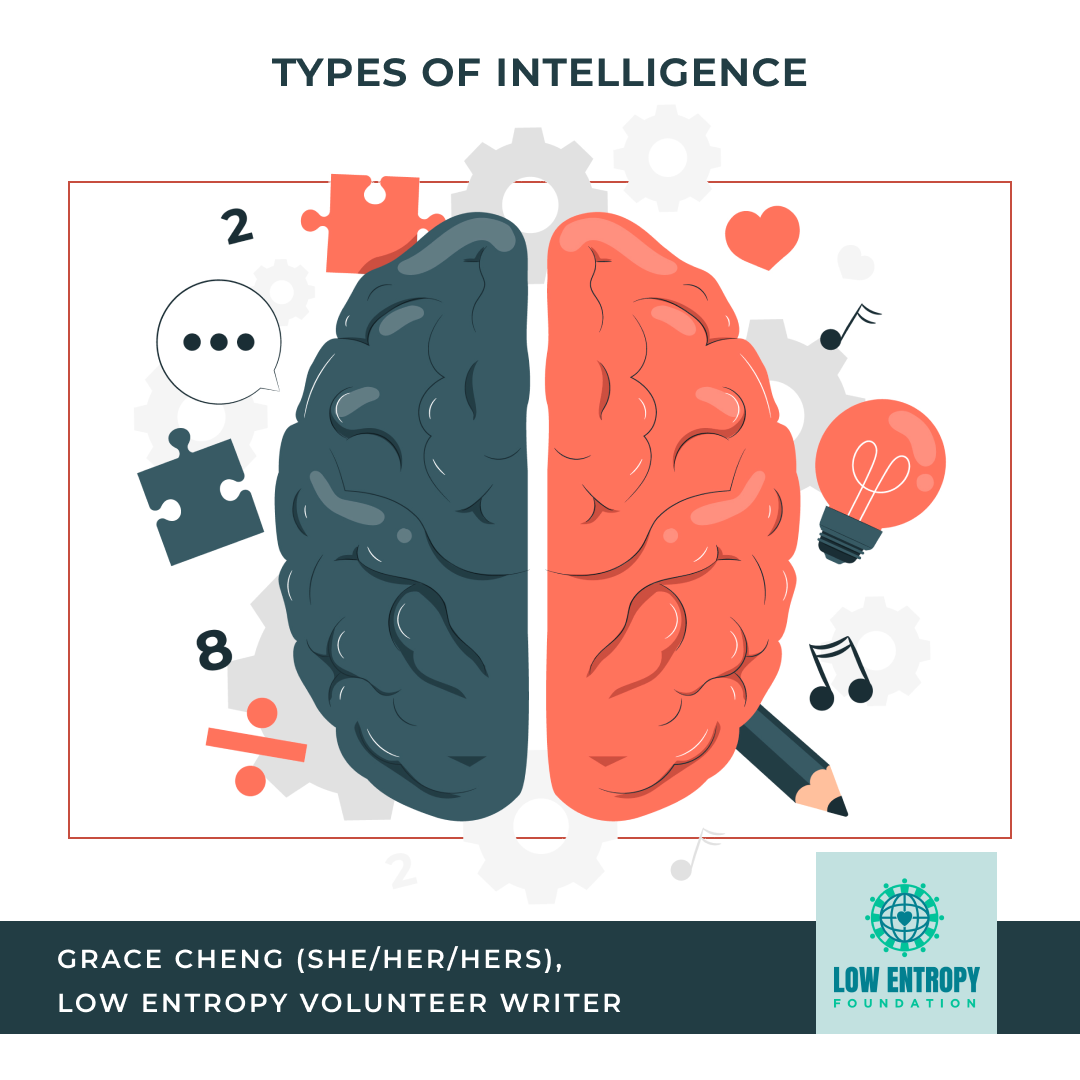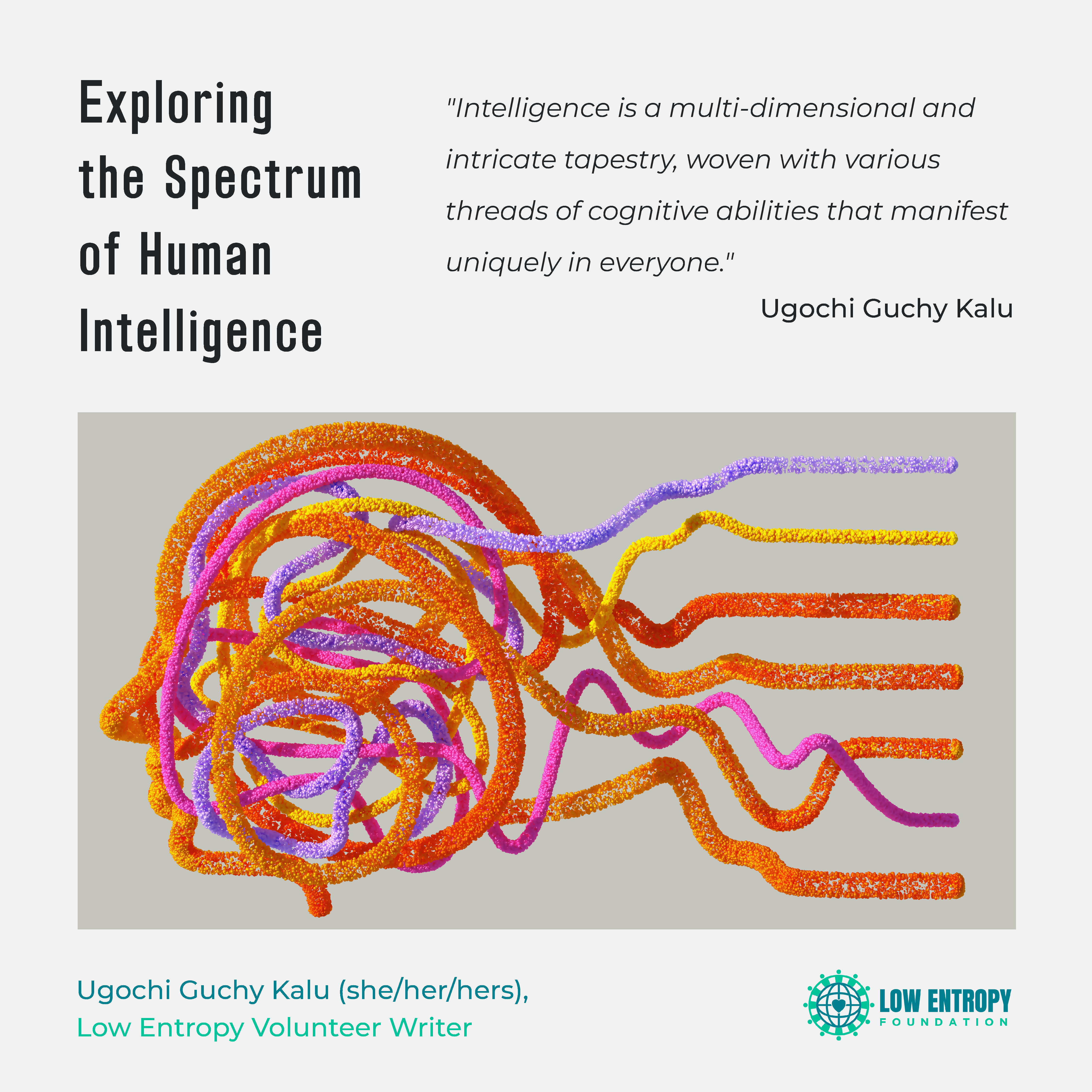Types of Intelligence
September 1, 2023

Grace Cheng (she/her/hers), Low Entropy Volunteer Writer
Intelligence is defined as the ability to acquire and understand knowledge and skills, and to apply them. However, many people fail to recognize that intelligence takes many forms. Traditional intelligence is typically associated with academic achievement, but there are different types of intelligence, and identifying your strengths will enable you to make the most of your skills.
The process of determining the type of intelligence you possess can be challenging, but several strategies can assist in this process. The first step is to analyze your strengths and weaknesses across a wide range of domains. Knowing what tasks or subjects come naturally to you and give you enjoyment can provide valuable insight into your intellectual preferences. Self-awareness can be strengthened by keeping a journal containing experiences and reflections relating to different types of intelligence.
You may also be able to identify your intelligence by seeking feedback from others. Friends, family, and teachers will be able to share observations or perceptions regarding an individual’s strengths that they may not be aware of. It is also possible for individuals to reveal latent talents and interests by engaging in diverse activities, such as music, sports or artistic endeavors, which can help them identify their dominant intelligence.
However, intelligence is not a fixed quality, but rather a dynamic and evolving one. A person can develop and enhance different intelligences through deliberate practice and a continuous learning process. By pursuing knowledge and engaging in activities that resonate with one’s dominant intelligence, one can accelerate their growth and achievement. This article aims to explore the different kinds of intelligence and provide guidance on how to ascertain our individual strengths in this diverse landscape.
- Linguistic intelligence
Linguistic intelligence refers to a particular insight into spoken and written language. A person with this characteristic can learn languages and use them effectively. People with linguistic intelligence can express complex meanings using language. They can analyze verbal and non-verbal information with great precision, understand words and non-verbal language, and create products that involve oral and written communication. This type of intelligence is typically possessed by writers and great communicators.
- Logical-mathematical intelligence
Logical-mathematical intelligence is the ability to analyze problems rationally, perform mathematical operations and investigate scientific questions. This skill involves calculations, quantifications, consideration of propositions and hypotheses, as well as complex logical reasoning. Individuals with this type of thinking can develop abstract and symbolic thinking skills, sequential reasoning skills, and inductive and deductive thought patterns. They can construct equations and proofs, perform calculations, and solve abstract problems, so they are generally comfortable in the fields of mathematics and physics.
- Spatial intelligence
Those with spatial intelligence can recognize and manipulate patterns in a wide area, like navigators and pilots can, as well as patterns in more confined spaces, as in the case of sculptors, surgeons, chess players and architects. Intelligence of this type is characterized by the ability to think in three dimensions. People with this aptitude are highly capable of recognizing and manipulating detailed and large-scale spatial images. Additionally, they tend to possess highly active imaginations.
- Body-kinesthetic intelligence
A person with body-kinesthetic intelligence can use parts of the body, or the entire body, to solve problems or produce products. A person with this type of intelligence may be an excellent athlete or dancer, but they may also be a surgeon, mechanic, physical therapist or cabinet maker. People with bodily or kinesthetic intelligence solve problems by forming a bond between their mind and body.
- Musical intelligence
Musical intelligence is characterized by the ability to interpret, compose, and appreciate musical patterns. Those with this type of intelligence can recognize and create musical tones, rhythms and timbres. They are very proficient at learning songs and rhythms, as well as composing music and playing different musical instruments. Their sensitivity to music can allow them to easily detect incorrect pitches or instruments that are out of tune.
- Interpersonal intelligence
Interpersonal intelligence refers to the ability to understand other people’s intentions, motivations and desires and to use these understandings to engage with others. Individuals who possess this type of intelligence can recognize and understand the psychological backgrounds of others. A major component of interpersonal intelligence is the ability to effectively communicate both verbally and non-verbally. A person who possesses this skill is aware of the differences between others, sensitivity to their moods, and ability to manage different perspectives from an empathic perspective.
- Intrapersonal intelligence
Intrapersonal intelligence involves the ability to understand oneself, as it is fundamentally inward. Individuals with this kind of intelligence are not just aware of their wishes, feelings, moods and expectations, but also use that information to intelligently manage their lives. People who possess this type of intelligence are also capable of developing self-cognition, that is, an understanding how their own cognitive processes (thinking, attention and memory) function, thus enabling them to make more effective decisions and solve problems.
- Naturalistic intelligence
Naturalistic intelligence refers to the ability to recognize, comprehend and appreciate the world around us. Those who possess this intelligence are adept at observing and identifying plants and animals, as well as possess an affinity for the environment. An individual with naturalistic intelligence may enjoy activities such as hiking and gardening, or have a desire to protect and conserve nature.
- Existential intelligence
Existential intelligence is an ability to contemplate and understand the meaning and purpose of life, and is a less commonly discussed form of intelligence. A person with this intelligence generally has a strong desire to explore philosophical and ethical questions, make sense of existence, and experience personal growth. You may possess existential intelligence if you are interested in philosophy or spirituality and often ponder life’s big questions.
- Creative Intelligence
Creative intelligence refers to the ability to combine intellect and imagination to develop an original idea or product. Although intelligence often involves the solving of problems, it does not always result in original solutions. Those with creative intelligence, on the other hand, think creatively and often produce innovative ideas. This type of intelligence involves an ability to envision multiple possibilities that have not yet materialized. Those who exhibit open and flexible thinking can see things from different perspectives to produce novel or unusual solutions.
Intelligence is far from a one-dimensional concept. It encompasses a wide range of cognitive abilities and aptitudes. By exploring the various types of intelligence, engaging in introspective reflection and experimental learning, and seeking feedback, individuals can begin to identify and leverage their unique strengths. Cultivating these strengths can lead to increased self-awareness, personal fulfillment, and the potential for significant contributions in various domains that best align with their intelligence.
—
Grace has an accounting and finance background. She enjoys reading, writing, listening to music, watching movies and playing sports.
GET INVOLVED
At Low Entropy, we believe changing the world starts with changing ourselves.
Founded in 2015, Low Entropy Facilitates conversations that encourage diversity and promote inclusivity.
We understand that life can be confusing at times. It can seem challenging and sometimes you may feel like no one really “gets you.” We offer an opportunity to connect with others who have the capacity to understand you.









